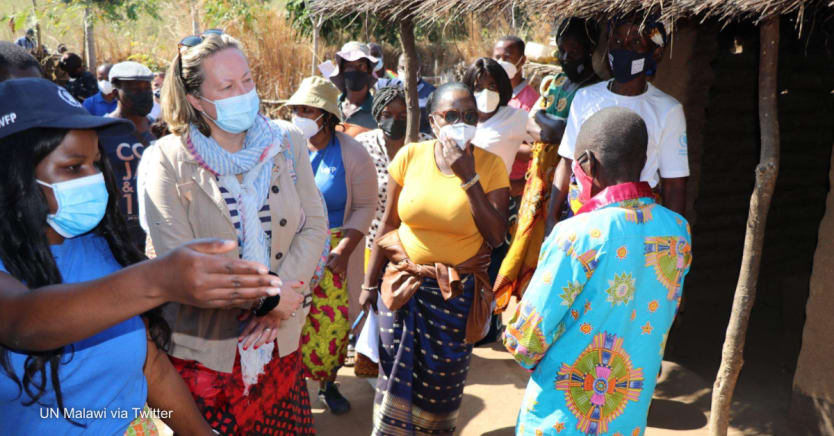
The British government’s climate adaptation czar visited a climate resilience project in Malawi last week — even though the initiative recently lost all U.K. aid funding for its implementing NGOs, allegedly ending support to nearly 1 million people.
Anne-Marie Trevelyan, who has been appointed “international champion on adaptation and resilience” for the U.K. presidency of the United Nations’ 2021 climate change conference, recently visited a Promoting Sustainable Partnerships for Empowered Resilience — or PROSPER — project in Balaka, southern Malawi. The project, which is part of the Building Resilience and Adaptation to Climate Change in Malawi program, aimed to reduce the impact of climate shocks and strengthen food security and social safety nets.
“The [U.K. aid] cuts are falling unfairly on the NGO sector, who work with the most marginalised poorest communities in the most fragile contexts.”
— A statement from United PurposeBut NGOs running PROSPER were told by the Foreign, Commonwealth & Development Office in May to end all activities by Thursday this week, according to evidence submitted to the International Development Committee, a group of politicians who monitor U.K. development policy.
“[It’s] fantastic to have had the opportunity to see the whole PROSPER project … a fantastic effort. Really, really proud that U.K. aid has been able to work with NGOs and the local council to make this possible,” Trevelyan said in a video posted to Twitter on Wednesday by the U.K. High Commission in Malawi. The video was retweeted by the official accounts of the climate conference and the World Food Programme’s Malawi operations.
An Aug. 3 tweet by the U.K. High Commission in Malawi also highlighted Trevelyan’s visit and said she was “today visiting projects in rural #Malawi aimed at supporting communities withstand the effects of climate change.”
Even after its severe cuts to the aid budget, the U.K. government has been trying to emphasize its green credentials ahead of November’s crucial climate conference, which is set to be held in Scotland with adaptation as a key theme.
But the government communications failed to mention that U.K. support for NGOs working on PROSPER — described as “the largest climate resilience building project in Malawi” — has ended. United Purpose, one of the NGOs implementing the program, submitted a statement to the International Development Committee saying it was told the NGOs’ contract “would be terminated due to UKAid cuts.”
The statement said that “more than 200,000 households, covering 900,000 people, will feel the impact of this cut on their lives, livelihoods and their ability to feed their families.”
The statement also said FCDO had not approved a closure budget by May 29, leaving United Purpose unable to enact “meaningful implementation” on the ground and raising questions about how the cuts were carried out.
PROSPER was jointly run by consortiums made up of U.N., NGO, and private sector groups. FCDO’s continuation of PROSPER with the U.N. consortium — under the World Food Programme’s leadership — raised “questions over value for money,” said United Purpose’s statement, because of the “significant costs associated with their structure and limited rooted presence in the districts.”
“The cuts are falling unfairly on the NGO sector, who work with the most marginalised poorest communities in the most fragile contexts,” the statement added.
Maria Jose Torres Macho, U.N. resident coordinator for Malawi, told Devex that the U.K. was “providing over £37.1 million” for PROSPER between 2021 and 2023. According to United Purpose’s statement, the total program allocation was £70 million for 2019 to 2023.
Tracking the UK’s controversial aid cuts
Keep up with the effects of the U.K. aid cuts via our regularly updated tracker.
“As UN Malawi, we have been closely coordinating with FCDO locally to ensure that when applying to PROSPER budget cuts (derived from the decision to reduce foreign aid globally) critical interventions are not disrupted and hard-won development gains are not eroded,” Torres Macho wrote.
“The UK budget reduction has led to the interruption of some activities, but WFP interventions - targeting the most vulnerable families - have been maintained,” Paul Turnbull, WFP country director in Malawi, wrote to Devex. “WFP recognizes the significant contribution of UK in the past years but fighting hunger and climate change requires steady investments.”
United Purpose declined to provide any further comment.








